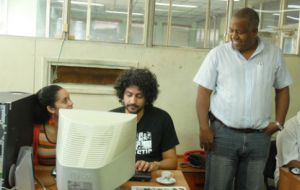MercoPress. South Atlantic News Agency
New editors for leading Cuban newspapers: “too much triumphalism and too apologetic”
 The new editor of Granma - Pelayo Terry (L) - is seen as less of a hardliner
The new editor of Granma - Pelayo Terry (L) - is seen as less of a hardliner Cuba has appointed new editors for the country's two main newspapers - Granma and Juventud Rebelde. The shake up in the island's tightly controlled media was described by the Communist Party as a “renewal”.
The new editor of Granma - Pelayo Terry - is seen as less of a hardliner than his predecessor. He has a Twitter account and has spoken in favour of using social media to promote dialogue.
The decision to replace the editorial command of the two papers was taken by the Communist Party's Politburo. Granma is the Politburo's official newspaper and Juventud Rebelde the daily of the Party's youth wing.
At the Party's congress in the summer, politicians called for a new type of journalism in Cuba, with less self-censorship and secrecy. This is seen as the first important development in that direction.
But news coverage in Cuban papers and television is still dominated by the official party line, with reports of official visits and positive reports about the country's economy.
President Raul Castro has described the country's media as “triumphalism” and “apologetic”.
The new editor of Granma is a former war correspondent in Ethiopia. He replaces Lazaro Barredo, who had been in the job for eight years. Mr Terry is also the previous editor of Juventud Rebelde. He is being replaced there by his deputy, Marina Menendez.
Raul Castro has introduced a number of moderate economic and political changes since taking over from his brother, Fidel, who resigned in 2008 for health reasons.
As part of the reforms, Cuba eased restrictions on its citizens travelling abroad. One of the high profile beneficiaries was Generation Y blogger Yoani Sanchez, who is critical of the government. She embarked on a three-month tour to several countries and returned to Havana at the end of May.




Top Comments
Disclaimer & comment rulesCommenting for this story is now closed.
If you have a Facebook account, become a fan and comment on our Facebook Page!